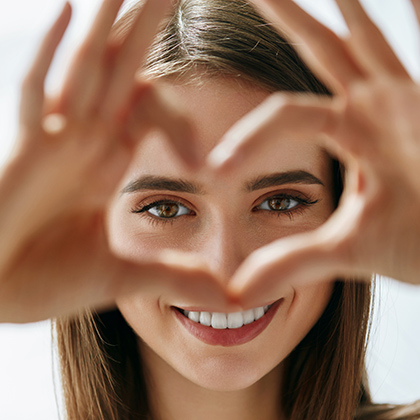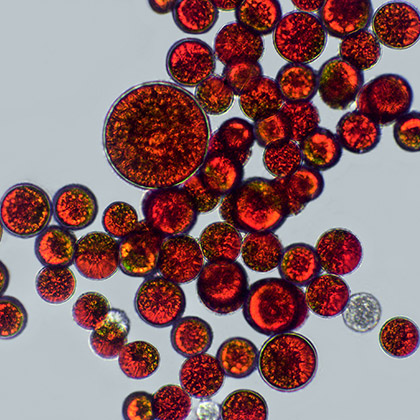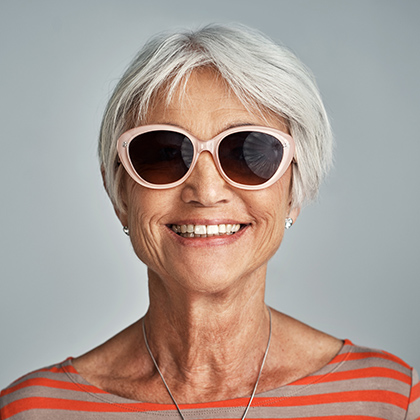
If you've ever had a restless night when you found it hard to fall – and stay – asleep, you’ll know how tired and generally under the weather it can make you feel the next day.
Sleep is arguably just as important for health and wellbeing as eating a healthy diet and being physically active. But it’s something many people aren’t getting enough of. According to the NHS, on average adults need seven to nine hours of sleep a nighti. Yet surveys consistently find many of us aren’t reaching that seven-hour minimum. The Sleep Council’s Great British Bedtime Report, for instance, suggests the majority of us are sleeping for less than seven hours, with 61 per cent admitting between five and seven hours a night is the normii.
One of the things that may be keeping some of us awake is exposure to blue light during the evening and night. Blue light is emitted by digital devices such as smartphones, tablets, computers and laptops. Even flat screen TVs expose you to it.
These digital devices use light-emitting diodes (LEDs) to generate light. But while LED light may appear white to the naked eye, it’s made up of all the different coloured visible light rays, with more blue light rays than red, orange, yellow and greeniii. Meanwhile blue light is also a component of sunlight, so you’re exposed to it outdoors too, even on a cloudy day.
Does blue light damage our eye health?
Indeed, blue light has become a popular research subject in recent years, thanks largely to the fact that we’re using digital technology so much more now than we used to. So it’s no wonder that many are concerned about its impact on our health, particularly eye health.

However, there’s no reliable evidence as of yet to suggest blue light may be damaging to your eyesight, despite what you may have read in the media – though admittedly where research into blue light and eye health is concerned, it’s still early days, find out more by reading Does Blue Light Really Have an Impact on Our Overall Eye Health?.
Blue light and your body clock
On the other hand, scientists believe there is good evidence that blue light may have an impact on sleep because of the way it interferes with something called the circadian rhythm.
One study, for example, compared the effects on human participants of reading a digital device (such as an iPad or tablet) before bedtime and that of reading an ordinary printed book made of paperiv. The results show that reading from a digital device affects the circadian rhythm and suppresses a hormone called melatonin, which your brain produces to make you feel sleepy.
The volunteers who used an iPad or similar before going to bed took longer to fall asleep (and longer to wake up in the morning), had less REM sleep (REM is the phase of sleep when you dream), and were more alert at bedtime than those who read ordinary books.
But what is the circadian rhythm exactly? Controlled by parts of the human brain called the suprachiasmatic nuclei, this is the 24-hour cycle that’s also often called the body clock, internal clock or biological clock.
This cycle makes your body know when it’s time to sleep, wake up and eat, along with many other processes, and is linked with hormone production and brainwave activity. It’s also affected by environmental factors such as light, darkness and temperature. So when it starts getting dark at the end of the day, your eyes send signals to the suprachiasmatic nuclei, which in turn signal the pineal gland in the brain to start producing melatonin.
But using a digital device in the evening means the blue light you’re exposed to interferes with these signals and prevents or delays the production of melatonin. Indeed, studies confirm that exposure to light in the evening and early part of the night can shift the circadian rhythm and suppress melatonin, making it harder for you to get to sleepv. Studies also suggest exposure to all types of visible light at night – particularly exposure to short-wavelength (including blue) light – makes you more alertvi.
Blue light advantages
Not all blue light is a bad thing, however. You need it during the daytime to help you feel awake, to boost your memory and cognitive function, and to elevate your mood. In fact, the type of light used in light therapy devices – such as light boxes and dawn simulators designed to help people with seasonal affective disorder (SAD) – contains a significant amount of blue light rays.
And according to the Association of Optometrists, there’s also good evidence that children who spend more time outdoors are at lower risk of developing short-sightedness, suggesting that exposure to blue light may even help prevent myopiavii.
How to get a better sleeping pattern
Turn devices off
If you use digital devices before going to bed and are finding it difficult to sleep, the best advice is to turn them off up to an hour before sleeping.
This is particularly appropriate for children, as they have less natural protection against blue light than adults (especially older adults). This is because some blue light is prevented from reaching the retina – the light-sensitive part of the eye – by the eye’s lens, but only when the lens starts to yellow with age (when we’re born the lenses in our eyes are clear, but they become more yellow as we get older).
The pupils in children’s eyes are larger than those of older people, so more light of all types reaches the retina of a younger person compared with someone older (the pupil is the hole in the centre of the eye that allows light into the eye).
Opt for nighttime settings
Another thing you could do to reduce your blue light exposure at night would be to use night settings if your device has them. These reduce the amount of blue light being emitted by your device’s screen during night-time hours. Night settings include Nightshift (Mac), Blue Light Settings (Windows) and Night Mode (Android). If your device doesn’t have a night setting, try turning down the screen brightness instead.
You could also try the following:
-
As well as limiting blue light from digital devices at night, consider using warm-coloured lightbulbs at home instead of cool/white-coloured ones. And at night keep the lights dim, as this may help your body to start producing melatonin.
-
During the daytime – especially the morning – try to spend time outdoors in the sunlight, as this may reduce the risk of disruption to your circadian rhythm.
-
Use a red light as a night light, as red light has long wavelengths and as such is the least likely type of visible light to affect your circadian rhythm.
-
Keep your bedroom as dark as possible at night – if this isn’t possible, try using a sleep mask.
-
Try wearing orange-tinted blue-blocking glasses during the evening, as there is some evidence to suggest they may prevent light-induced melatonin suppressionviii. Find out more about blue-blocking glasses by reading Are Blue Light Glasses Really Enough to Protect Your Eyes.
-
If all else fails, go camping, as one study suggests avoiding all artificial light sources for a weekend could help reset your circadian rhythmix.
For more tips on getting a good night’s sleep, read our guide to insomnia. Meanwhile, there’s lots more information to help you keep your vision healthy in our Vision Health Hub.
References:
-
Available online: https://www.nhs.uk/conditions/insomnia
-
The Sleep Council. The Great British Bedtime Report . Available online: https://sleepcouncil.org.uk/wp-content/uploads/2018/04/The-Great-British-Bedtime-Report-2017.pdf
-
Tosini, G., Ferguson, I., Tsubota, K. Effects of blue light on the circadian system and eye physiology. Mol Vis. 2016. ;22: 61–72. Available online: https://www.ncbi.nlm.nih.gov/pmc/articles/PMC4734149
-
Chang, A.M., et al. Evening use of light-emitting eReaders negatively affects sleep, circadian timing, and next-morning alertness. PNAS. January 27, 2015. ;112 (4) 1232-1237. Available online: https://www.pnas.org/content/112/4/1232
-
Zeitzer, , et al. Sensitivity of the human circadian pacemaker to nocturnal light: melatonin phase resetting and suppression. J of Phys, Vol 526, issue 3, 695 - 702. Aug 2000. Available online: https://physoc.onlinelibrary.wiley.com/doi/full/10.1111/j.1469-7793.2000.00695.x
Brainard, G.C., et al. Dose-response relationship between light irradiance and the suppression of plasma melatonin in human volunteers. Brain Res. 1988 Jun 28. ;454(1-2):212-8. Available online: https://www.ncbi.nlm.nih.gov/pubmed/3409004?dopt=Abstract
Khalsa, S.B.S., et al. A Phase Response Curve to Single Bright Light Pulses in Human Subjects. J of Phys, Vol 549, Issue 3, 954 - 952. June 2003. -
Cajochen, C., et al. Dose-response relationship for light intensity and ocular and electroencephalographic correlates of human alertness. Behav Brain Res. 2000 Oct. ;115(1):75-83. Available online: https://www.ncbi.nlm.nih.gov/pubmed/10996410?dopt=Abstract
Cajochen, C., et al. Alerting effects of light. Sleep Med Rev. 2007 Dec. ;11(6):453-64. Available online: https://www.ncbi.nlm.nih.gov/pubmed/17936041?dopt=Abstract -
Available online: https://www.aop.org.uk/advice-and-support/for-patients/childrens-eye-health/screen-time-for-kids-facts-for-parents
-
Sasseville, A., Paquet, N., Sevigny, J., Hebert, A. Blue blocker glasses impede the capacity of bright light to suppress melatonin production. Pineal Res. Vol 41, Issue 1, 73-38. Aug 2006. Available online: https://onlinelibrary.wiley.com/doi/full/10.1111/j.1600-079X.2006.00332.x
Burkhard, K., Phelps, J.R. Amber lenses to block blue light and improve sleep: a randomized trial. Chronobiol Int. 2009 Dec. ;26(8):1602-12. Available online: https://www.ncbi.nlm.nih.gov/pubmed/20030543 -
Stothard, , et al. Circadian Entrainment to the Natural Light-Dark Cycle across Seasons and the Weekend. Curr Biol. Vol 27, issue 4, 508 - 513. February 2017 . Available online: https://www.cell.com/current-biology/fulltext/S0960-9822(16)31522-6?
Related Posts?
Disclaimer: The information presented by Nature's Best is for informational purposes only. It is based on scientific studies (human, animal, or in vitro), clinical experience, or traditional usage as cited in each article. The results reported may not necessarily occur in all individuals. Self-treatment is not recommended for life-threatening conditions that require medical treatment under a doctor's care. For many of the conditions discussed, treatment with prescription or over the counter medication is also available. Consult your doctor, practitioner, and/or pharmacist for any health problem and before using any supplements or before making any changes in prescribed medications.

Christine
Christine Morgan has been a freelance health and wellbeing journalist for almost 20 years, having written for numerous publications including the Daily Mirror, S Magazine, Top Sante, Healthy, Woman & Home, Zest, Allergy, Healthy Times and Pregnancy & Birth; she has also edited several titles such as Women’ Health, Shine’s Real Health & Beauty and All About Health.
View More



